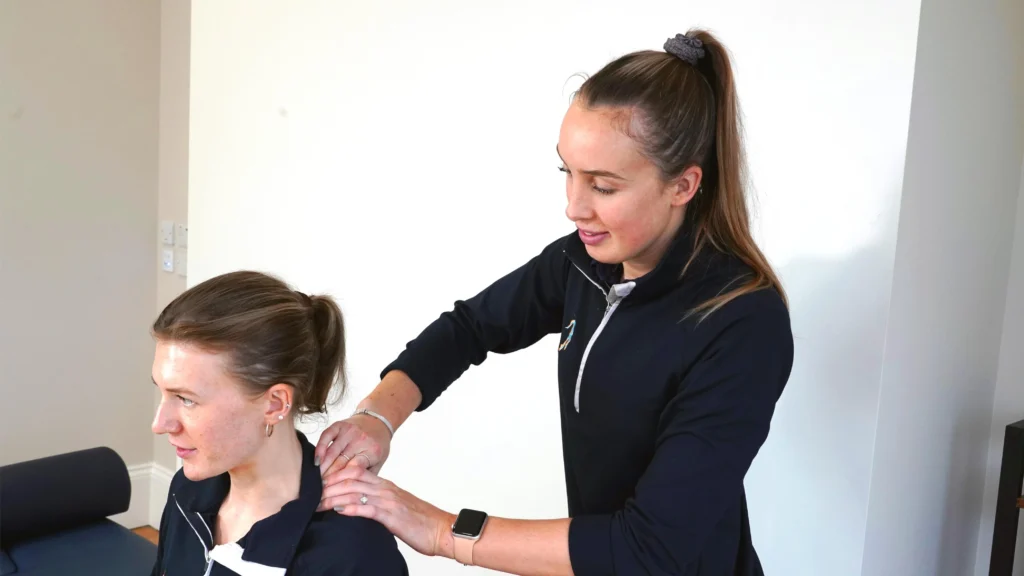We Help You Beat Shoulder Pain And Feel Like ‘You’ Again Quickly And Safely.

Rotator cuff injuries involve damage to the group of four muscles and their tendons that surround the shoulder joint, providing stability and movement. Common injuries include tears, strains, or inflammation of the tendons. The likely cause of these injuries are from trauma to the shoulder, however repetitive movements and age related degeneration can contribute to the pain as well. These injuries often cause shoulder pain, weakness, and limited range of motion, particularly when lifting the arm or reaching overhead.
Shoulder impingement syndrome occurs when the tendons of the rotator cuff become compressed or irritated as they pass through the narrow space beneath the acromion. This condition can cause pain, especially when lifting the arm, and may lead to inflammation, swelling, or tearing of the tendons. Repetitive overhead activities, like swimming or throwing, are common causes of shoulder impingement.
Frozen shoulder, or adhesive capsulitis, is a condition where the shoulder becomes stiff, painful, and difficult to move. It occurs when the connective tissue surrounding the shoulder joint thickens and tightens, restricting movement. Frozen shoulder typically develops gradually, with symptoms progressing through stages of pain, stiffness, and eventually a “thawing” phase where mobility improves over time. The exact cause is not always clear, but it is more common after injury, surgery, or prolonged immobility.
Shoulder instability happens when the structures that hold the shoulder joint together (such as ligaments, muscles, and tendons) are too loose, allowing the shoulder to move excessively or even dislocate. This can result in pain, weakness, and a feeling that the shoulder may “give out” during certain movements. Shoulder instability can be present during rotator cuff injuries, repetitive strain injuries or congenital looseness of the shoulder joint.
Bursitis occurs when the bursae, small fluid-filled sacs that cushion and reduce friction in the shoulder, become inflamed, causing pain and tenderness to the shoulder.
Tendonitis refers to the inflammation of the tendons, often due to overuse or repetitive stress, particularly affecting the rotator cuff tendons. Both Bursitis & Tendonitis can lead to shoulder pain, particularly when moving the joint, and may co-occur with other shoulder issues like impingement or rotator cuff injuries.
Schedule a convenient time for your initial visit using our online booking system or by giving us a call. Evening and Saturday appointments are available to suit your schedule.
You’ll have one-to-one appointments with an expert back pain physio at our Huddersfield clinic. From your first visit, we will establish the root cause of the problem, set your goals, and work together to get you there.
Receive immediate relief with our hands-on treatments. We’ll build your treatment plan around your lifestyle.
Continue your back pain treatment with our support and regular follow-up appointments, and any necessary adjustments to ensure lasting relief and a pain-free life.
We follow a proven system that allows us to get repeatable, predictable results for you by finding the true cause of your symptoms.









Physiotherapists can help individuals regain strength, flexibility and function in their shoulder to perform daily activities and return to sports or recreational activities safely and without pain.
There are many different types of shoulder pain, from rotator cuff injuries, to impingement, and tendon problems. No matter what type of shoulder pain you present with, your therapist will help you identify the root cause and put a plan in place to get rid of the pain long term.
In your first session your therapist will listen to your story, do a thorough assessment, and clearly explain the reason for your pain. Together, you will come up with a treatment plan to address the root cause. Each session the therapist will review your progress, provide manual therapy, and update your rehab plan as appropriate until you achieve your end goals.
No, you do not need a referral from your doctor to see one of our therapists at ProSport Physiotherapy. We offer direct access to assessment and treatment, so you can book an appointment without any prior medical referral. This allows you to start addressing your shoulder pain quickly and get back to the activities you love sooner.
Yes, you can generally continue with many of your regular activities during shoulder physiotherapy treatment. However, it depends on the severity of your condition and the specific activities you are involved in. Your therapist will guide you on what movements to modify or avoid to prevent aggravation, as well as what exercises to integrate into your daily routine to speed up recovery. The key is to maintain an active lifestyle while respecting the healing process.
The key to effective treatment, regardless of whether it’s physiotherapy, chiropractic care, or massage therapy, is having a skilled therapist who focuses on identifying and treating the root cause of your problem. While each profession may use different techniques, a good therapist should always be working to address the underlying issue rather than simply managing the symptoms.
Physiotherapy at ProSport is centred on a thorough approach to diagnosis and rehabilitation. We focus on restoring movement, strength, and function through evidence-based practices like manual therapy, tailored exercise programmes, and education to prevent the issue from recurring.
Chiropractic care often involves spinal adjustments and manipulation that can often help alleviate symptoms, however, it’s crucial that your chiropractor also works to resolve the root cause to ensure long-term relief.
Massage therapy is great for easing muscle tension and promoting relaxation, which can help alleviate pain in the short term. However, without addressing the underlying cause, the pain may return after the immediate discomfort has been relieved.
At ProSport Physiotherapy, we focus on providing lasting solutions by getting to the root cause of the problem. Regardless of the treatment method, a good therapist will always aim for long-term recovery rather than temporary relief.
About
Resources
Quick Links